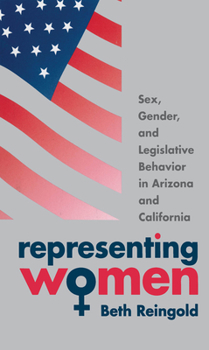Representing Women: Sex, Gender, and Legislative Behavior in Arizona and California
Select Format
Select Condition 
Book Overview
Women in public office are often assumed to "make a difference" for women, as women -- in other words, to represent their female constituents better than do their male counterparts. But is sex really an accurate predictor of a legislator's political choices and actions? In this book, Beth Reingold compares the representational activities and attitudes of male and female members of the Arizona and California state legislatures to illuminate the broader implications of the election and integration of women into public office. In the process, she challenges many of the assumptions that underlie popular expectations of women and men in politics.
Using in-depth interviews, survey responses, and legislative records, Reingold actually uncovers more similarities between female and male politicians than differences. Moreover, the stories she presents strongly suggest that rather than assuming that who our representatives are determines what they will do in office, we must acknowledge the possibility that the influence of gender on legislative behavior can be weakened, distorted, or accentuated by powerful forces within the social and political contexts of elective office.
Using in-depth interviews, survey responses, and legislative records, Reingold actually uncovers more similarities between female and male politicians than differences. Moreover, the stories she presents strongly suggest that rather than assuming that who our representatives are determines what they will do in office, we must acknowledge the possibility that the influence of gender on legislative behavior can be weakened, distorted, or accentuated by powerful forces within the social and political contexts of elective office.
Format:Paperback
Language:English
ISBN:0807848506
ISBN13:9780807848500
Release Date:April 2000
Publisher:University of North Carolina Press
Length:352 Pages
Weight:1.20 lbs.
Dimensions:0.9" x 6.2" x 9.3"
Customer Reviews
1 rating
Great resource in examining gender effectiveness in politics
Published by Thriftbooks.com User , 25 years ago
Playing off the double entendre in the title of her book, Beth Reingold examines the representative nature, action, and effectiveness of women legislators. "Are women in public office simply women who represent, or are they also women who represent women? And what about the men in public office-do they represent women? Do they represent women to the same extent their female counterparts do"(2)? Reingold researches legislative records, conducts extensive personal interviews, and issues surveys to male and female legislators of California and Arizona in order to deconstruct popular views of female/male representation.By defining, dissecting, and finally, dismissing the"strategy of difference" (what legislators attribute to legitimize women's positions in legislation) in chapter 1, Reingold is able to prove that there are no significant differences between the representing behavior of men and women legislators (243). In fact there are more similarities, than there are differences.Utilizing Hanna Pitkin's (1967) work, The Concept of Representation, as a framework, Reingold further reveals that in "neither [the California nor Arizona] legislature was being female (descriptive representation) a guarantee of attitudes and activities associated with women (substantive representation)"(30, 243). Men and women have an equal opportunity to effectively represent women.Reingold research proves that "descriptive representation was, as a criterion for substantive representation, neither absolutely necessary nor always sufficient" (243). These findings indicate two things: (1) men are able to fairly and successfully represent women, regardless of the lack personal or bodily connection (i.e. abortion); and (2)women representatives do not always make a difference for women adequately or justly. Reingold is quick to say that it does make a difference that women hold public office,even if the importance only lies in increasing the numbers.Beth Reingold's research and findings brilliantly challenges the foundations of gender politics and expectations in America.





